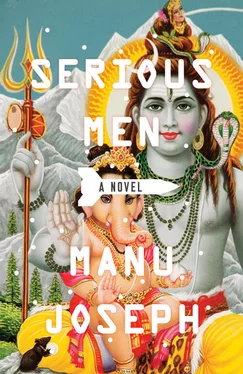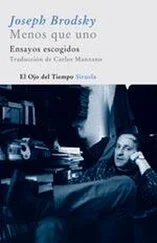It preoccupied him the whole afternoon and made him fear that he was getting obsessed with an insane idea. But in the evening, when Acharya gave him the handwritten letter for Adi, his fever began to subside. It was now confirmed. Adi would not take the test. By the time Ayyan entered the perpetual laments of the BDD chawls, his nefarious excitement had died away without a trace.
In the inner reaches of BDD, there was a festive spirit that evening. Ayyan realized that all heads on the broken cobbled pathways were turned in one direction. Children were sprinting to where the elders were gawking. Near Block Thirty-Three, a crude stage had been erected. A small crowd was gathering near it. Huge speakers were piled on both sides of the stage. Some men were stringing fairylights between two lamp-posts. There was a sudden roar from the crowd. A thin, spirited boy had just walked on to the stage. He was wearing black leather trousers and a black shirt with gleaming silver dots. He took his position at the centre of the stage. His back was to the audience and his legs were parted. That suggested breakdance.
The boy stood waiting for the music to begin. The crowd grew. The boy turned and looked unhappily at his friends near the stage who were having a problem with the sound system. They somehow always did before a breakdance. Ayyan had seen this a thousand times — a boy in leather trousers standing with his back to the audience, legs parted and waiting sheepishly for the music to start. But this time, the wait was brief. Portentous drum-beats filled the night. The boy’s hips began to sway. And he stretched his hands sideways. From the tip of his left hand, a wave began and moved like a violent fit towards his shoulder and then to his right hand, and was about to return the same way when the music died abruptly. His hands fell. He parted his legs again and waited.
Ayyan resumed his walk home. From the shadows emerged a drunkard in loose shorts and a T-shirt that said ‘Smart’, and loose shorts.
‘Mani,’ the drunk said. Even though the man was swaying in a personal gale that only a mixture of rum and egg-roast could unleash, there was something deep and strong about his voice. It was an authority that came from another time, when they were just boys and so close and their simple fates seemed interwoven. Ayyan, who usually handled such defeated friends by continuing to walk with nods and murmurs, was forced to stop. ‘Mani,’ the man said, ‘You know what happened to Pandu?’
Ayyan shook his head. Pandu was the fastest underarm bowler Lower Parel had probably ever seen. That was a long time ago, when he was an unreasonably happy boy who used to draw erotic images of girls with their little buckets, all waiting in the toilet queues beneath a providential sunbeam. In time, the unhappiness of adulthood and the slave job as a driver for Balaji Car Hire transformed Pandu. He grew silent and never found the time to sketch, and drank like a fool every night.
‘He is dead, Mani, he is dead,’ the man said with a chuckle. ‘Police picked him up last night. His owner said that he stole some money. This morning the police came to his house and told his wife that he had hanged himself in the lockup.’
Ayyan’s temples moved in a silent rage, because here everyone knew what it meant when the police said a man had hanged himself in custody.
‘They beat him to death, Mani, they beat the life out of him,’ the drunk said and walked away muttering that Pandu, the greatest painter whom no one knew, was dead.
Oja Mani opened the door in annoyed haste and went back to sit transfixed in front of the television. Ayyan surveyed the dramatic wailing of the women in the soap. It somehow comforted him.
Pandu deserved the tears of all. Ayyan imagined the prime-time tears in every home in the nation, in every distraught character and in every woman enthralled by the soap, and dedicated the million melancholies to the memory of a boy who once found freedom in art. But then the drama ended abruptly, and there was this sudden gaiety of Red Label Tea. A woman with long flowing hair was serving tea to her family and everybody was becoming ecstatic after a single sip. It was cruel that on the night when the broken body of Pandu was still lying in a morgue, his woman running her frail shivering fingers on the wounds of his chest, and the cops instructing her to accept that the wounds were caused by his cowardly suicide, the wails of the mourners in Oja’s serial must be interrupted by the joys of tea.
Oja sprang to life and began magically to put together a meal.
‘Adi,’ she screamed. It was just a word, but the way she said it meant different things at different times. The boy was sitting near the fridge, turning the pages of a textbook. He was a bit dejected these days because the game had ended. Teachers were still wary of him at school, his classmates still called him ‘brains’ and the neighbours continued to beg him to teach their children, but he knew his heroic status would soon be forgotten if it were not replenished with fresh achievements. He threw the book away and slid to the centre of the room for dinner. Ayyan wanted the attention of his wife who was setting the plates on the floor.
‘You know, Oja,’ he said, ‘there are tea cups that cost five thousand rupees.’
‘A single cup?’ she asked.
‘Yes. Five thousand rupees.’
‘I would be so scared to drink from it,’ she said, sitting down to eat.
‘If you could buy it, you wouldn’t be scared,’ he said.
The commercials ended and Ayyan slowly drifted into the trauma of the soap. He felt a peaceful grief in his heart that numbed all his muscles. And this gloom would stay with him for many days, long after he ceased to mourn a lost friend.
The tired face of Oja, the despondence of Adi, the thousand eyes that gaped vacantly in the grey corridors, the widows who sat and sat, the nocturnal love songs of the drunkards, and the youth who stood impatiently in the toilet queues to go seize the day, and of course fail — all this and more, Ayyan was finally willing to accept as home because the other life, the bewitching life of creating a whole myth, was dangerous. And only bachelors had the fortune to be foolish.
THESE DAYS, HIS thoughts of Oparna Goshmaulik reminded Acharya of an ancient scar in the centre of his huge forehead. The scar was inflicted over three decades ago by a young Belgian astronomer named Pol Voorhoof who threw an unopened beer bottle at him. That night, they were with friends in a New York pub called Zero Gravity. Acharya, who by then was convinced that the wide acceptance of the Big Bang theory was influenced by a Christian compulsion to believe in a beginning and an end, accused the Belgians of starting the whole fraud. It was a Belgian Catholic priest named Georges Lemaître who in 1927 had come up with the idea that the universe began from the explosion of an atom. Unable to bear Acharya’s long unprovoked polemic against Belgians, Voorhoof responded by calling Indians half-naked imbeciles, and even accused their goddesses of being topless tribals. In the happy stupor of inebriation, Acharya stood on the table and declared to the pub that he was smarter than all the Belgians in the world and challenged them to a round of blindfold chess. Voorhoof, of course, accepted the challenge.
They were blindfolded with the kerchiefs given by cautiously excited girls who were confused by the intellectual duel of two foreign men. Acharya and the Belgian spoke their moves, and a drunken friend offered to move the pieces on a chessboard that a waiter had produced. Acharya won in five minutes and let out a long operatic laughter with his blindfold still on. Voorhoof, who was also blindfolded, took an unopened beer bottle and flung it in the direction of the laughter. The bottle found its target but, fortunately for Acharya, it broke only after it hit the ground. But it left a deep gash in his forehead, and for the first time in his life he tasted blood. The gash hurt so much in the coming days that he refused to believe a time would come when he would no longer feel the pain. Long after the wound healed, every time he felt sad, he would think of the scar and remind himself not only of the fleeting transience of pain but also of convictions, friends, love, daughters and everything else that men held so dear.
Читать дальше












